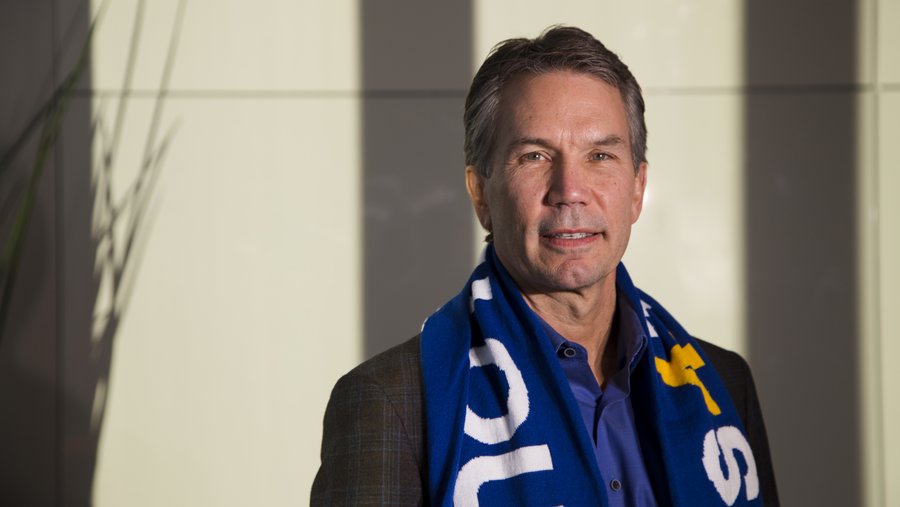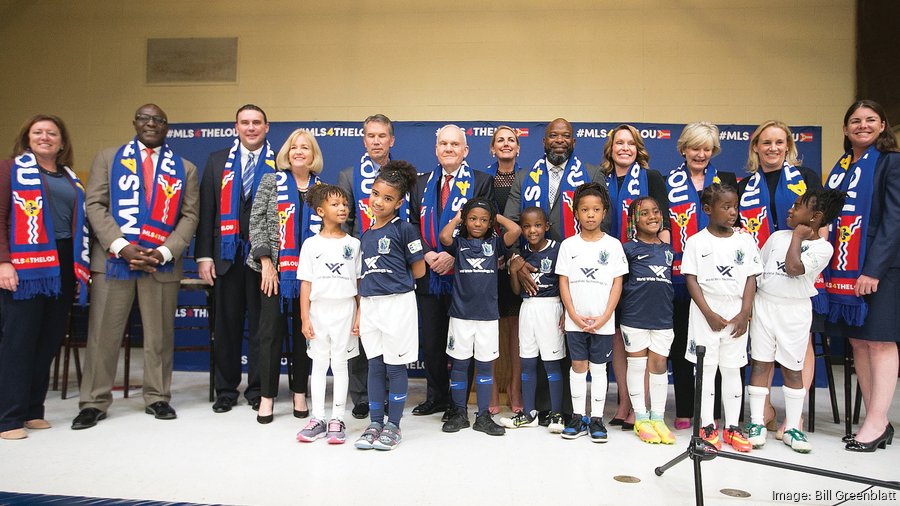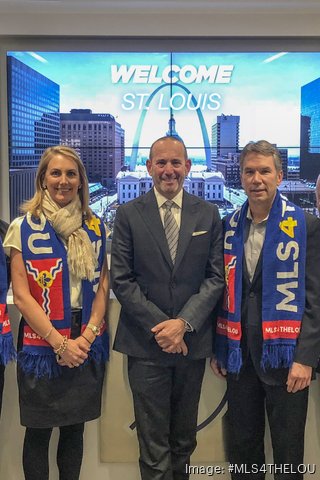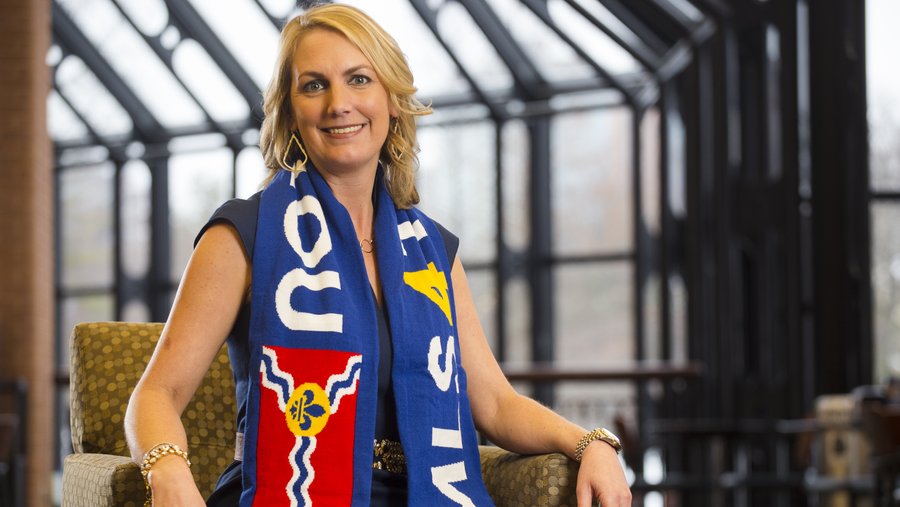Jim Kavanaugh's dream had just died.
It was the morning of April 5, 2017, and St. Louis city voters had just rejected a ballot initiative that would have helped pay for a $140 million Major League Soccer stadium downtown. The measure, Proposition 2, had fallen 3,200 votes shy — better than Kavanaugh had expected for an election that excluded the bigger county electorate and a campaign that failed to align the necessary political support.
The CEO of World Wide Technology would soon announce he was disbanding the group seeking an expansion franchise in MLS, the top flight of American soccer. He was unwilling to go through it again, at least not without a significant change.
“Unless there is some kind of epiphany from somebody outside of our ownership group, we’re not going back to the drawing board and figuring out how to make this work,” Kavanaugh said after the vote.
It took a year, but eventually that epiphany would emerge.
An unexpected text message in April 2018 would connect Kavanaugh to Enterprise Holdings Chairman Andy Taylor and Carolyn Kindle Betz, president of Enterprise Holdings Foundation. Over the next six months, they would resuscitate St. Louis' MLS ambitions by building what many consider a bullet-proof bid for the league's 28th franchise.
Their plan still calls for a downtown stadium near Union Station. But this time it adds another local investor with deep pockets, allowing it to pitch a mostly privately financed $200 million stadium plan. And thanks to the structure of the ownership group — comprised of Kavanaugh, Taylor and seven female members of the Taylor family, led by Kindle Betz — it comes to the table with a unique narrative: It would become the league's first franchise to be majority-owned by women.
"Strategically," Kindle Betz said, "you can’t get much better than that."
Still, competition for a MLS franchise has grown fierce, especially in the last two weeks. In joining the bid, the Taylor family single-handedly catapulted St. Louis to the top of the list of expansion contenders. But their place in the league is far from guaranteed, and if St. Louis doesn't gain franchise No. 28, there's also no guarantee this ownership group will stick around for the next round of expansion, if there is one.
“I don’t really know how you could say ‘no’ to us,” Kindle Betz said. “You have a region that so desperately wants this team and wants to support this team.”
So if the MLS picks another market?
"It might be one of those things where it's just kind of time to say, 'You know what? I don't think this is a good partnership,'" Kindle Betz said.

The text
The text message that would bring new life to the city's MLS hopes came in April from Lee Broughton, a former Enterprise Holdings marketing executive and now marketing consultant for new ownership group #MLS4THELOU. He told Kavanaugh that Andy Taylor was interested in meeting about the effort to bring MLS to St. Louis.
Kavanaugh, who along with Taylor is a member of the St. Louis Blues ownership group, didn't expect much to come of it.
“I really didn’t think that Andy and the Taylors were overly interested," Kavanaugh said. "But I’m always happy to see if very successful people are interested in hearing more about it. Maybe there’s something there."
At their first lunch, Taylor asked Kavanaugh to walk him through the challenges and opportunities in the previous failed effort. Kavanaugh gave him a “very, very high level” overview of the financial model. It was enough to pique his interest.
“He said, ‘Well, I’m interested in hearing more,’” Kavanaugh said. “I honestly still didn’t think he was serious.” Even so, after consulting with World Wide Technology CFO Tom Strunk, Kavanaugh again met with Taylor, covering more details.
Meanwhile, Taylor met with Kindle Betz and her mother, Jo Ann Taylor Kindle, chairwoman of the Enterprise Holdings Foundation, to ask what they thought about soccer coming to St. Louis.
“I said I think it’s extremely important,” Kindle Betz said. “I think St. Louis is a three professional sports town; you don’t really see an NFL team or an NBA team on the horizon coming here.” More importantly, since soccer is an international sport, she thought it would be good for the community by helping elevate St. Louis to a “premier international city."
Not knowing exactly how serious her uncle was about the idea, Kindle Betz told him a MLS franchise for St. Louis was "a great idea."
“And my uncle literally said, ‘OK, meet me downstairs at 12:30, we’re going to a meeting,’” she said. “All of a sudden, we’re at the World Wide Technology building.”
Kindle Betz said she was taken by the broad cultural appeal of soccer. She was also impressed by the league, saying "it seems to be a very good system that's run well, and that’s important to us as business owners.”
As their talks moved forward, the Taylor family saw how MLS and the growth of soccer “could positively impact the community and downtown St. Louis,” Kavanaugh said. “That’s where I said, 'hey, fantastic; I’d love to take another shot at this.'”
The opportunity
For most of its first 10 years, Major League Soccer, which made its debut in 1996, was a 10-team league. By the time Kavanaugh launched his initial expansion effort in 2017, MLS was in the midst of a 12-year expansion era in which the league grew to 24 franchises in the U.S. and Canada.
The league opened bidding for its 25th and 26th franchises, with the intent of eventually growing to 28. St. Louis was an early contender in a field that included Charlotte, Cincinnati, Detroit, Indianapolis, Nashville, Phoenix, Raleigh-Durham, Sacramento, San Antonio, San Diego and Tampa/St. Petersburg.
Its prospects looked good.
In 2015, Kavanaugh — a former star at Saint Louis University who went on to play professional indoor soccer and once featured on a 1984 U.S. Olympic soccer squad — launched Saint Louis F.C. in what is now called the USL Championship, one level below MLS. The club bred a devoted following, led by a supporters’ group, the St. Louligans, responsible for building the kind of grassroots fan culture MLS has found appealing in other markets.
MLS also favors local ownership with deep ties to the community, and preferably with a pedigree in sports and operations experience.
Kavanaugh checked all those boxes. The primary element of his plan that doomed the 2017 bid was financing: The effort sought $60 million in public money for the stadium. That was a big ask coming right on the heels of the NFL’s Rams leaving St. Louis for Los Angeles, with the city still footing the bill for The Dome at America’s Center.
“It was a challenge for the Board of Aldermen to get behind what we were doing considering the governor (newly elected Gov. Eric Greitens) was very mixed through the entire process,” Kavanaugh said.
The failure of Proposition 2 effectively killed the St. Louis MLS bid. The league granted the 25th and 26th franchises to Cincinnati, which begins play in MLS this spring, and Nashville, which begins in 2020.
If St. Louis, a city proud of its rich soccer heritage, were to ever find its place in the nation’s highest league, it would need a savior.
“We were dead in the water,” said Patrick Rishe, director of the sports business program at Washington University's Olin Business School. “The Taylors stepping up changed everything.”

The game plan
Once the Taylors came on board, the ownership group — which adopted the social-media friendly name #MLS4THELOU — began formulating a game plan that could overcome the failures of the 2017 effort.
Rishe said the Taylors’ inclusion solved one key piece of the puzzle: It solidified the group’s ownership base.
Kavanaugh's World Wide Technology is the region’s second-largest privately held company with $10.4 billion in 2017 revenue. It's second only to the Taylors’ Enterprise Holdings, the car rental giant that in 2017 generated $22.3 billion in revenue.
With such a partnership, “strategically, you can’t get much better than that,” Kindle Betz said. The group at one point considered adding other investors, “but they weren’t from St. Louis and we just didn’t think that would be sort of a good path to go down; not because they weren’t wonderful people, but because to keep it truly local ownership, that was the path we ultimately chose.”
In better financial position than the previous expansion effort, the #MLS4THELOU group was able to commit a more significant investment without the need for any public financing other than taxes generated from the stadium site.
“I don’t think the (2017) investor group would have been as aggressive as this group, and specifically the Taylor family, in regard to the personal investment, without taking a more aggressive approach on the ‘ask’ for the public funding,” Kavanaugh said.
The group also worked to garner political support early. Before revealing itself to the public in October, they secured the support of St. Louis Mayor Lyda Krewson and Gov. Mike Parson. Doing so before any public announcement was critical to lending credibility to the bid, Kindle Betz said.
“We wanted to show the entire region we were serious,” she said. The investors wanted a very “inclusive” announcement, that “we need the support of everyone.”
They also met with MLS Commissioner Don Garber in September to gather feedback on their proposals and visited the stadiums of MLS clubs New York Red Bulls, Sporting Kansas City, Los Angeles Galaxy, L.A. F.C. and Minnesota United on a roadshow to gather input for their own stadium design.
“Our message was, ‘We’re here, we will fight, (do) everything we can to make sure that we show them we are the best city to win an MLS team,’” Kindle Betz said.

Pressure mounts
A big question remains: What happens if the league doesn’t award St. Louis its next franchise?
MLS on Jan. 15 awarded its 27th franchise to Austin, Texas, a market that wasn’t in the expansion discussion a year ago but emerged as a contender after Columbus Crew SC owner Anthony Precourt sought to relocate his club there last year. Precourt eventually sold the Crew to an Ohio-based ownership group and the league granted him an expansion franchise in Texas.
That leaves club No. 28.
Dan Courtemanche, MLS’ executive vice president for communications, said the league’s board of governors — which is responsible for selecting expansion markets — is at present only focused on choosing franchise No. 28.
The sweepstakes for that franchise tightened two weeks ago when the ownership group in Sacramento, California — considered by many to be St. Louis’ biggest competition in the MLS sweepstakes — added its missing link when billionaire private equity executive Ron Burkle, co-owner of the NHL's Pittsburgh Penguins, signed on as a lead investor.
Courtemanche said the board of governors is considering the feasibility of expanding beyond 28, following up on Garber's comments in December when he said "there's no doubt in my mind that we can support having more than 28 teams."
But a timetable for further expansion — or whether it happens at all — isn’t guaranteed.
“In this particular case, I think one of the particular concerns that MLS may have with respect to St. Louis is if they don’t give them an indication sooner rather than later, the ownership group here may ultimately decide ‘hey, we can’t wait forever,’” Rishe said. “If the Taylors and Kavanaugh make that point, that might force MLS’ hand.”
Rishe said he wouldn’t be surprised to see the league break from its stated position and expand beyond 28 immediately. “I really think with the quality of the two bids, and since Garber has already tipped his hand that he is willing to go beyond 28, why not just invite both teams now?” Rishe said.
Since the #MLS4THELOU effort was announced in October, the ownership group has been quietly continuing to work on details of its plan, including the proposed stadium, Kavanaugh said. The ownership group last week released a picture of Kindle Betz and Kavanaugh smiling with Garber at the league offices in New York. And Courtemanche confirmed to the Business Journal that the league is identifying a time to visit St. Louis soon.
“Our goal has been to focus on the things we can control and kind of control our own destiny,” Kavanaugh said.
But he and Kindle Betz also made it clear: They won’t wait around forever.
“We feel pretty good, but we’ve all been in business for a long time, and strange things happen,” Kavanaugh said. “If we do all the right things and we put a great plan in place, I don’t think this investor group will be sitting around waiting for years to get approval. They’ll probably go out and do something else.”
Nathan Rubbelke contributed to this report.
